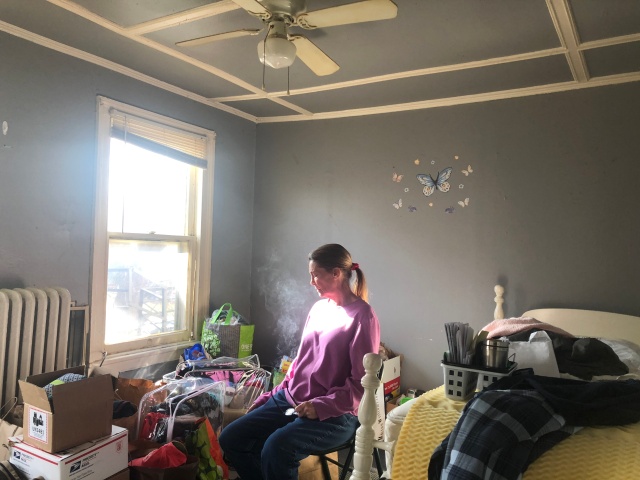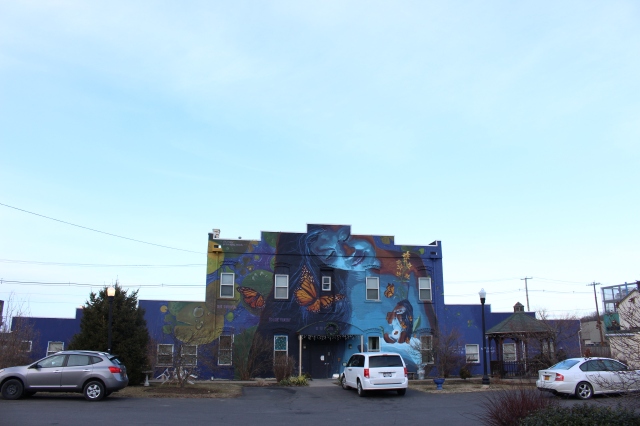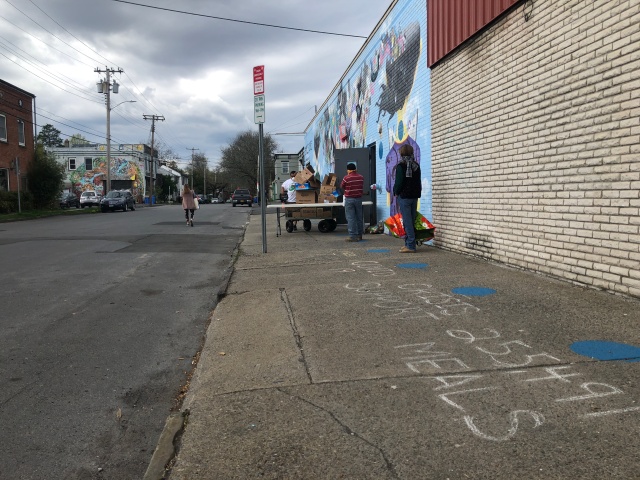Edited and Packaged by Brian Rice

Bri, a resident of the Darmstadt Shelter in Kingston, had hopped between temporary shelters for five years in lower Manhattan at the time of her accident. The shelter only agreed to allow an interview with Bri if her full name was made confidential. On June 16, 2016, the Saugerties native stood aside a set of subway tracks near 7th Avenue and 14th Street. The last thing she remembered was staring at her phone before she fainted and fell on the tracks.
Three days later, she awoke in a Bellevue Hospital bed, where she remained for two months. Bri’s legs were gone. Large stitches stretched across her face and scalp, while her neck suffered a hairline fracture. She originally moved to Manhattan to tackle an opioid-addiction that wreaked havoc on her life, but hadn’t abused drugs in 11 years when she became paralyzed. Her efforts to find permanent housing were fruitless before the incident and now the idea seemed impossible.
“We were just spinning in this wheel to get placement and it just wasn’t happening,” Bri said about her time in the Manhattan shelter system. This was years before her move to the Darmstadt Shelter.
Louanne, who requested that her last name not be used out of safety concerns, flew 1,400 miles to escape the streets of Merritt Island, Florida and a mentally abusive boyfriend. She usually visited the East Coast Baptist Church every Monday to collect donated clothing and take a shower. That’s where she heard about a “house of faith” in Ulster Park, which housed homeless people who are suffering from addiction. Louanne didn’t qualify.
“I had never done drugs before then, but I was desperate and living in the hood,” Louanne said.
Two days before her flight to New York she smoked crack for the first time. A positive drug test seemed like her only salvation.
When Louanne left, she abandoned her identity. Her birth certificate, social security card and dozens of family photos disappeared when she could no longer afford the fees for the storage unit they were kept in. The contents of her life were sold to the highest bidder, leaving her with no choice but to move on. She was the last living member of her immediate family and was now completely alone in a foreign state.
Although Bri and Louanne took very different paths, they eventually met at the Darmstadt Shelter. This shelter is part of Family of Woodstock, which is a “multi-program human service agency” serving low-income clients in Ulster County and the surrounding area, according to their agency summary. The summary describes Darmstadt as a 23-bed homeless shelter for adult men and women, primarily those in recovery from substance abuse.
When COVID-19 pandemic sent New York into a statewide quarantine, Bri and Louanne found themselves on opposite sides of social services. Bri became quarantined by Darmstadt’s lockdown while Louanne was left to survive without a supportive crutch.
Louanne moved into a boarding house just days before Darmstadt closed its doors to ex-residents and visitors. Her independence came with an array of risks and challenges she never had to face while living in the shelter. The treatment for Louanne’s psoriasis, a skin condition causing painful rashes on the scalp, robbed her of an immune system. She puts her life in her hands with every trip for food and supplies. Louanne also suffers from a muscular disease in her back, preventing her from working.
Bri, on the other hand, was stranded inside the shelter with nowhere else to turn. She spent the first two weeks isolated from her fiancé, Anthony, and children. While the world around her seemed to stop, Bri persevered, and continued working tirelessly to find an apartment. She didn’t find many apartments in her price range with doors that are wide enough for her wheelchair.
Disabled homeless people are among the most vulnerable pockets of the population during the COVID-19 pandemic, according to the Centers for Disease Control and Prevention. Susan McDonough, head of housing services for the Ulster County Department of Social Services (UCDSS), said that finding housing for the Ulster homeless population has become more difficult since she took over 15 years ago.
“They have more medical and mental health issues and are mainly unemployable… It’s hard to find housing on our [rental assistance] grants, based on the [available] rent amounts out there.”
Susan McDonough
The U.S. Department of Housing and Urban Development (HUD) is a federal agency that oversees the housing needs of American citizens. Bri and Louanne fall into HUD’s “chronically homeless” population, which includes individuals with a disability who have been homeless for at least one year or experienced four episodes of homelessness in the last three years. According to HUD’s 2019 Annual Homelessness Assessment to Congress, over 96,000 people were reported to have patterns of chronic homelessness.
Without supplemental income, these women must make ends meet with what little financial resources they are afforded. Their physical and mental ailments are only amplified as doctor’s appointments move to the phone and landlords lock their doors to potential renters. Bri and Louanne’s first few weeks in one of America’s most pandemic-stricken states exemplify the limitations of social services and the chaos that COVID-19 caused for the disabled homeless population.
Seeking Shelter, Finding Darmstadt

Bri’s addiction began around the time of her father’s death. Bri was pregnant while her father was sick in the hospital, with infected bed sores. She gave birth just a week before he died.
“I remember just throwing myself on top of him, over his chest, and hugging him,” Bri said. “It was really bad.”
Her father’s cousin finally pulled her off of the bed and told her it was over. She couldn’t bear to see her father in such a withered state, but agreed to bring her daughter to the hospital, to meet her grandfather.
She did, and he died three hours later.
Bri’s doctors prescribed her Xanax to help her cope with the post-traumatic stress disorder from watching her father suffer and postpartum depression. But when it wasn’t enough to ease the pain, Bri turned to heroin.
As her opioid-addiction worsened, Bri’s husband then urged her to leave Saugerties — where she lived along with her family for 35 years. She was too close to home to get better, he said. Two weeks after she enrolled in a Manhattan rehabilitation center, he filed for divorce. She felt betrayed and hurt beyond words. Not long after, Bri discovered that her ex-husband lost custody of their children. Now she would need her own apartment before she could begin to legally reclaim them.
“I fight for my kids right down to my last breath,” Bri said. “My kids are asking me to come home, and we’re trying to get this apartment, but it sucks to see [other shelter residents] walk in whatever apartment they want to.”
According to the 2019 Ulster County Opioid Prevention Strategic Action Plan, there were 56 opioid-related deaths in Ulster in 2018. These figures represented a staggering 93% increase in opioid fatalities from 2015 to 2018. In fact, Ulster County has the second highest rate of opioid deaths out of any county in New York State, except for New York City.
McDonough explained that it’s often hard for people with addiction to qualify for social services, since many shelters and programs require residents to enroll in rehabilitation programs. Liz Bahr, director of Darmstadt, explained that alcohol and drug consumption is banned for residents of her shelter. Residents are breathalyzed each time they re-enter the building, even if it’s only for a cigarette in the parking lot. Darmstadt is also allowed to mandate drug tests for residents if they appear to have relapsed. Bri is thankful that this rule supports her continued sobriety.
“There’s not much you can do to help them if they’re going to lie about it,” Bahr said. “If they actually want some help, we’ll refer them to a drug and alcohol program.”
The only good Bri found in the city was her fiance Anthony, who she met in rehab. After the accident, Anthony was her hero. He helped her in the shower, shopped for groceries and cooked all her meals. The two never found an apartment in Manhattan, so Bri decided it was time to move back upstate and look for an apartment in Kingston. On June 5, 2019, the two made their way to UCDSS where Bri was placed in Darmstadt. Since the shelter only accepted single adults, Anothony found a nearby boarding house and continued to support Bri from afar.
The last place Louanne lived was in a spare room of a woman’s trailer in Cocoa, Florida. She shared the room with her former partner who criticised her every movement. She couldn’t cook right and couldn’t walk next to him. He would preach gospel to her like she was a sinner.
“We got along well and shared laughs. I respected him because he was a marine, but I had no idea how much he drank.” Louanne said.“I knew he was abusive, but I was scared to sleep alone.”
She remembered having to go to bed with her medication bag tied to her arm, in fear of robbery. Cocoa was ranked ninth among the 18 most dangerous Florida cities with under 100,000 residents in 2018, according to an article written by Florida Daily.
Louanne became homeless in August 2019, after she was fired from her job as a casino card dealer on a cruise ship. After working 58 hours, over four days, she accidentally fell asleep during a sexual harassment video one the morning at work. After she was laid off, she found that no one was hiring a 55-year-old woman with bad credit. Louanne soon found herself living on the street.
Ulster County Sheriff’s Detective Albert Babcock attested to the danger homeless people face living on the street. In August 2019, 58-year-old Guy Andradez was found dead in the woods after suffering multiple stab wounds while homeless in Kingston. Babcock has spoken with many homeless people over the past four years. Many of his interactions stemmed from his work with the Ulster County Continuum of Care, which conducts an annual count of the homeless population in the shelter system and on the streets on one night in January.
“It’s a very violent community,” Babcock said. “They carry all of their worldly possessions with them. If you don’t want your stuff stolen from you, you have to use violence to protect it.”
Louanne knew that escape was necessary for her survival, but her boyfriend couldn’t know. She was certain that he wouldn’t let her leave if he found out. Louanne spent two days, before her trip to the faith house, hiding with different friends. She said the easiest, and most shameful, part of her journey was finding the crack she smoked in order to qualify for care. Louanne felt hopeful as she flew towards her new home.
When she finally arrived at the faith house, it was not what she expected. The property was divided into a men’s camp and a women’s camp. Louanne was the only female resident and was left isolated for the majority of her stay. The only time she saw her fellow residents was during scattered Bible classes and group therapy sessions throughout the week. Louanne felt abandoned and trapped. One night, she used the office phone to call a mental health hotline and plead for her rescue. On November 24, 2019, a State Trooper and Ulster County Sheriff picked her up and drove her to Kingston Hospital, and later dropped her off at the Ulster County Warming Center.
“I was so paranoid that I didn’t know if Kingston Hospital or the doctors were even real,” Louanne said.
When she initially approached UCDSS, she was looking for a shelter specializing in domestic abuse. However, social services felt that she didn’t qualify and was better suited for Darmstadt.
“I guess I didn’t get beat up bad enough,” Louanne said.
Traumatic stories, like Bri’s and Louanne’s, is the one common thread Bahr sees woven among the diverse pool of tenants who enter Darmstadt. In fact half of the struggle as a caregiver is gaining her tenants’ trust and making them feel safe enough to open up about their pasts. They must also overcome the suffocating stigma against homeless people, which prevents many from seeking help in the first place.
“People have this idea about homeless people: that they are just a bum who is too lazy to get a job,” said Bahr. “Most of the people who come here are not like that.”
To complicate matters further, McDonough explained that social services can’t provide help unless it is sought by an individual. The UCDSS relies on outside organizations, like Family of Woodstock, for community outreach and to find affordable housing for clients as well. The social service system relies on the ambition of the homeless population, which is often prevented by physical and mental disabilities. But if no one is looking, no one is found.
Quarantined.
WEEK 1 & 2 OF NEW YORK STATE LOCKDOWN
COVID-19 brought Bri’s strenuous journey to a near standstill when Darmstadt began its quarantine.
All visitors, including those with donations, were not permitted on the shelter property. Bri explained that the shelter offered rides, one at a time, to doctor’s appointments. However, nearly all of her doctors suspended appointments until further notice. Before quarantine, Bri was excited about a pair of prosthetic legs that were being made for her. Soon, she could abandon the wheelchair and walk again. Without the necessary appointments, this massive milestone in Bri’s life could not come to fruition.
Family Inn, a 90-day emergency shelter for families in Kingston, is following similar protocol. Anika Morgan, an adult case manager at Family Inn, says the facility asks new residents if they’ve been in contact with an infected person or traveled outside of the country recently. They also check for signs of respiratory infections and COVID-19 symptoms. Newcomers with coughs are turned away and referred back to UCDSS. Family Inn has only seven rooms, with a maximum capacity of 14 residents. They must put the safety of their current tenants first.
Bri was still able to see her children if she scheduled a ride with prior notice. However, her custody case workers mandated a two-week quarantine period before visitation was possible. Even Anthony was not allowed to visit. Additionally, McDonough said that UCDSS isn’t giving out extra money to clients for the time being. This means Anthony cannot qualify for the FreedomCare, where Medicaid would pay him to provide necessary care for Bri. She normally saw him every day, whether he was driving her to pick up medication or taking her out to lunch. She was completely disconnected from her biggest supporters and the driving force behind her fight for housing.
“I want my children to be in a safe environment that’s clean, but it’s best for them,” Bri said. “[Anthony] is stuck in worse conditions than me. I feel bad.”
Before quarantine, Bri was close to securing the perfect apartment to suit her needs. The doors were big enough to roll her chair through, wide showers with a seat and plenty of space to cook in the kitchen. She knew something went wrong when the landlord did not respond to her messages for a week. By the time the landlord got back to her, she was told someone signed the lease first.
Bri says the frequency of her panic attacks have only escalated since quarantine began. Along with her aforementioned conditions, she grapples with depression, anxiety and obsessive-compulsive disorder. Bri now speaks with her therapist, over the phone, once or twice a week to work through the added stress.
McDonough said that they halted their usual housing search requirement for homeless and shelter residents to ease their anxieties. Normally, UCDSS required clients to submit a list of apartments that they looked at on a bi-weekly basis. The list must include details like the unit’s rent price, utility costs and number of rooms. McDonough explained that since most of her clients don’t own laptops, or have access to public computers, this task is not possible.
“This type of work is about person-to-person communication, which is not possible with this [pandemic],” said Elizabeth Celeya, director of strategic initiatives for Hudson River Housing.
Hudson River Housing (HRH) is an affordable housing agency that owns a number of homeless shelters in Poughkeepsie, Dutchess County and the greater Hudson Valley area. Along with other shelters in the Hudson Valley, they are adapting to the pandemic on an hourly basis and encountering unique obstacles. Many of their facilities normally operate on a nightly basis, where clients enter in the late evening and leave in the early morning. They have since converted to an overnight facility, having to provide twice the care with their staff reduced by 50%. Family Inn is suffering a similar fate, having to provide lunches for their child residents who are no longer in school. Morgan and Celeya both said that while their kitchen staffs are stressed, they were blessed to have an ample food supply from local nonprofits.
While food supply is not currently an issue, Celeya and Morgan both say their shelters struggled to collect hygienic supplies like disinfectant wipes and toilet paper. They say these supplies were ransacked from most nearby stores as people prepared for the worst.
“This is such a rapidly changing situation that we don’t know what it’s going to look like [in the future],” Celeya said.
At Risk and Alone.
In the early stages of the pandemic, Louanne sat in the waiting lobby of the UCDSS doctor’s office for an appointment. In order to qualify for a disability check, the doctor needed to confirm her conditions.
She met the receptionist at the glass, but couldn’t quite hear what she was saying.
“I’m sorry, I can’t hear you,” Louanne said. “I’ve had this sinus infection since last June.”
Louanne never got her appointment that day. The mere mention of a respiratory infection was enough to get her visit cancelled, and postponed until further notice. Since Louanne is unable to work, she relies solely on her $446 Temporary Assistance check to pay rent and $194 in food stamps from Ulster’s Supplemental Nutrition Assistance Program. However, food stamps can only be spent on food and do not include hygienic products. Her rent at the boarding house costs $440, leaving her with $6 a month to spread freely. The most money she’s earned, since living in Darmstadt, was $20 her building supervisor gave her to clean his apartment.
McDonough says the $446 check is the standard grant that single adults are given from UCDSS. She said that this grant only increases by $140 for a two-parent household with children. Single adults, without children, also have a mandatory 45-day waiting period before their financial aid kicks in.
In order to qualify for financial assistance, UCDSS asks clients to prove their identity, citizenship, social security card and birth certificate, McDonough explained. During her stay at Darmstadt, Louanne received no monetary assistance since she lost her identifying documents in Florida. She grappled with the State of Pennsylvania for months, trying to get a new copy of her birth-certificate, and only received it in the beginning of May. Luckily, Bahr was able to work out an agreement with UCDSS to have her boarding house rent covered well before then.

Louanne is once again the only woman in her housing complex, sharing a bathroom with other male residents. If her fellow tenants aren’t extremely vigilant about their health, Louanne risks contracting germs and losing her life.
She faces the same danger whenever she leaves her apartment for food and to refill her medications. It is a 20 minute walk, both ways, from the nearest grocery store to her apartment. When food stamps begin to thin, her only other option is another 20 minute journey to People’s Place Food Pantry & Thrift Store. She can only visit the pantry twice a month, forcing her to pick her visits wisely. Louanne’s psoriatic arthritis and dystonia, a neurological disorder which causes uncontrollable muscle movement, make these trips incredibly taxing. She says a substantial supplies run can keep her in pain for days afterwards.
Sharon Mary Chrisholm is the executive director of Chiz’s Heart Street boarding house. Chiz’s shelters 39 residents, most with schizophrenia or other mental illnesses. She says her residents are scared and anxious. She has difficulty keeping them from wandering outdoors and panhandling on the street. But she’s able to feed them all regularly in her own facility, with assigned seating and thoroughly cleaned facilities.
“People need to be seen and held, in sort of a spiritual way,” Chrisholm said. “It’s important that we act as a family now.”
In both a literal and figurative sense, Louanne does not have that family. While she technically lives independently, she is entirely dependent on the support of social services. The only supplemental income she receives are sparse donations from her sister-in law, former employers and her aunt in Pennsylvania. Louanne is resigned to cooking meals in her room and playing poker.
Until the UCDSS doctor confirms her disabilities, Louanne must live on a strict budget or risk losing the great strides she has made. That day is too unclear to determine.
“All these sequence of events came crashing down around me, and showed me what I have become,” Louanne said. “You kind of feel helpless on the phone, when you can’t see the person face-to-face.
Despite her hardships, Louanne is glad to have left Darmstadt. She could take her medicine when she felt she needed it, not at scheduled hours in the shelter office. Loanne said that she dealt with a lifetime of correction from her family and ex-boyfriend, which led to her struggles with mental illness. As much as possible, she just wanted to live life as she saw fit.
Louanne felt free.
To read more about the COVID-ERA and PEOPLE, check out similar articles below:
Erica Ruggiero writes about the impact that COVID-19 has had on internships and the people involved.
Anne-Marie Durkin sheds light on how it felt to be a graduating college senior in the midst of a global pandemic.
Nick Porpora dives into COVID-19’s impact on the movie theatre industry.
Joseph Juste examines the measures taken by local food pantries and meal services to provide services while staying safe during a pandemic.
Taylor Dowd provides insight on hunger relief organizations in New Paltz and Ulster and how they’re managing during the pandemic
